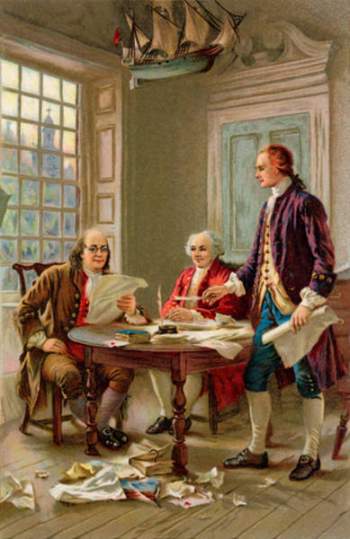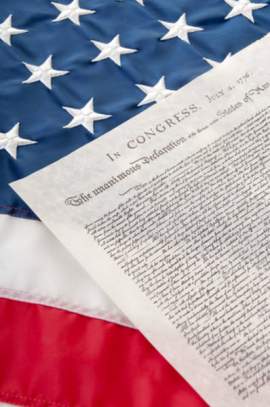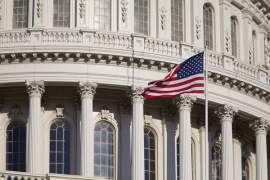
Understanding the Treaty of Paris

Popular In Constitution
Purpose Of Lifetime Appointment And Pros And Cons Enumerated Powers Bicameral Legislature Background Article 3 Of The Constitution We The People 1st Amendment Who Wrote The Constitution Judicial Review Equal Protection Clause 10th Amendment Three Fifths Compromise 5th Amendment
The Treaty of Paris was a doctrine signed by both British and American representatives on September 3rd, 1783, which officially, diplomatically, and politically solidified the independence of the United States of America from the British monarchy. Though the Revolutionary War had ended in 1776 - unofficially establishing the United States of America as a sovereign nation - the Treaty of Paris formulated diplomatic parameters by which both the British and American nations were required to abide.
Once the British monarchy, now under the rule of King George III, recognized the United States of America as an independent, sovereign nation, other European powers such as the French, Spanish, and Dutch were inclined to follow suit. As a result, a framework of guidelines was established in the Treaty of Paris in order to ensure respectful diplomacy between the newly-borne United States of America and its European counterparts.
Authorship of the Treaty of Paris is credited to Benjamin Franklin, John Adams, and John Jay. The fundamentals expressed within the text of the Treaty of Paris address various contingencies and situations, ranging from diplomacy, commerce, and the specification of borders. In addition, so as to not repeat the perceived tyranny of the British monarchy under King George II, the authors included clauses within the Treaty of Paris that ensured fair and just dealings with the British Loyalists - both freed, as well as those in captivity - who still remained in the United States of America. The Treaty of Paris is considered to be the United States of America’s first dogmatic doctrine establishing foreign policy.
Many American political figureheads, as well as early settlers, were adamant about westward expansion. However, the authors of the Treaty of Paris were wary of conducting tyrannical diplomatic dealings and, as a result, they were meticulous in their establishment of borders prior to allowing settlers to colonize the Western frontier. Settlers who wished to participate in the westward expansion were permitted to colonize what we now know as Ohio, Indiana, Illinois, Michigan, Wisconsin, and some of Minnesota. By regulating westward expansion, diplomatic relations could be maintained as a result of preventing the encroachment onto territory that belonged to other European nations.
The Treaty of Paris demanded that specified unclaimed lands be shared by multiple nations. For instance, both British and American merchants were permitted to cultivate the land and sea on eastern-coastal Canadian provinces, such as Nova Scotia.
The Revolutionary War granted the United States of America independence from British rule, and after their defeat, a majority of British citizens returned to England. However, the Loyalists who remained willingly, and even those who were in captivity, found themselves to be a minority amongst the newly-established United States citizens; a dynamic that created opportunities for the exploitation of the remaining British loyalists.
British loyalists, both freed, as well as in captivity, were robbed of their lands and possessions, many times without reason or sound justification. The authors of the Treaty of Paris delineated their democratic principles from the pre-existing behaviors of the British Monarchy and, as a result, all land unlawfully seized from British Loyalists was ordered to be returned. In addition, all prisoners (both British and American) were ordered to be set free and allowed safe return to their respective homelands.
Finally, the Treaty of Paris instructed that all lawful debt be collected in a fair and just manner, regardless of the nationality of the debt holder. Both British and American citizens were treated equally.
The Treaty of Paris represents the United States of America’s first diplomatic endeavor. As a result of their unjust treatment by the British monarchy, the authors of the Treaty of Paris wished to portray a more humane and just method of diplomatic dealings.


















